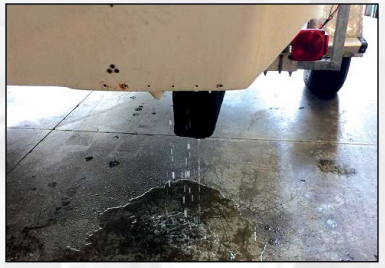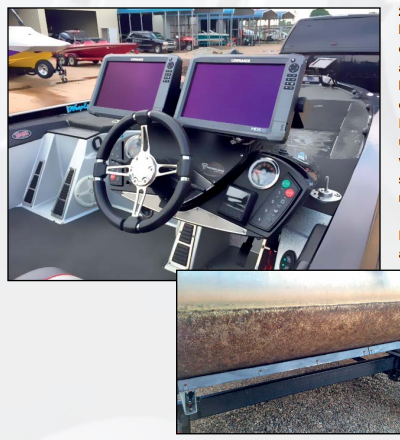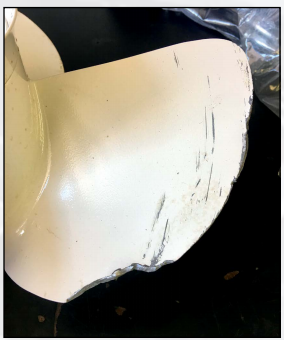From time to time you may notice that your boat does not run as fast as it used to, or an identical boat is faster than yours, and you may be convinced the engine is the problem. Often, there are other factors or boat issues that cause the problem. Let’s take a few minutes go over some common problems.
1) Weight – A boat will never be as light as when a you pick it up from a dealership. You are always adding to it and rarely take it away. It is surprising how much stuff you can cram into compartments. The weight of safety gear, tackle, anchors, extra batteries, and other equipment takes
a toll on speed. Also, where the weight is placed has an effect on speed. Not only is it harder for the engine to push a boat with more weight, it also
usually creates more drag on the wet surface of the hull. It’s not uncommon to see a 1 mph speed increase on a boat where weight is moved from the
front of the boat to the rear. If the boat is a pontoon, be sure to check for water in the “toons” or “logs.”

2) Drag – Whether it is aerodynamic or hydrodynamic, drag kills speed. Adding a couple of shallow-water anchor poles can reduce speed
a couple of miles per hour or more on a bass boat. And with today’s array of bigger and better electronics, people like to upgrade their equipment.
It is not uncommon to see up to four 10″ to 12″ units mounted on tournament bass boats. Rarely will these large units fit in the dash or front panel, so they have to be left installed on mounts – which makes them about as aerodynamic as a barn.
Boats that remain in the water will see a growth of algae or other marine organisms. It’s not unusual to see a 10 mph decrease in speed on a
pontoon boat with heavy growth. Even slight growth can knock off a few miles per hour. If in doubt, pull the boat out of the water and give it a good pressure washing. Offshore boats with old bottom paint can benefit from a
good cleaning and re-painting. Don’t overlook growth on lower units and props as well.

3) Power Robbers – Any drag racer can tell you that many factors affect the horsepower of an engine. Temperature, atmospheric pressure, humidity, and elevation all affect power. A boat that ran well with a good hole shot in the spring or fall might have trouble getting on plane and can typically lose several mph in the heat of summer. Savvy bass fisherman are well aware of this and usually have a smaller pitch prop they run during the hottest part of the year. If you trailer your boats to bodies of water at different elevations may also notice performance losses.
Fuel is another factor that can affect speed and performance. Most of our variable camshaft timing (VCT) engines benefit from 89 octane fuel for maximum performance. They will run on 87, but at a reduced power level. Make sure you are aware of octane requirements during the delivery process. A lot of complaints from boaters come early in the spring. They all arrive and fill their tanks with fuel and find their boat is sluggish and notice a lower top-end speed. It is possible that the gas stations still have winter-blend fuel in their tanks, or the fuel may be old. Remember that fuel will start to lose octane 30 days after leaving the refinery. Remember to purchase fuel from a quality gas station that does a lot of business, to ensure the gasoline is fresh.

4) Boat/Propeller – From time to time, we occasionally see older boats that suffer some speed loss. Check the boat bottom for excessive scratches, dings, and other damage. Also, boats with wooden stringers, floors, and transoms may absorb water, which will weigh them down. Even composite boats and foam flotation can absorb water.
We’ve also seen a boat that couldn’t reach full trim because of a worn jack plate. This reduced the trim-out angle and prevented the boat from lifting like it should, resulting in speed loss.
Propellers are another potential source of speed loss. Damage to propellers can definitely affect speed. Dings and chunks missing are obvious, but we’ve seen props that looked fine that had run through a sandbar. One particular instance of this knocked a little of the propeller cup out, resulting in a 2 mph speed loss. Also, remember that most props are hand-finished when manufactured, so one prop may run slightly faster than another.
To sum everything up, if you have speed or performance loss, the engine may not be the issue at all. If you’ve checked to be sure the engine is mechanically sound with good compression/leakdown numbers, installed
new spark plugs and verified proper ignition system operation and ignition timing, and made sure the fuel pressure on the rails at WOT is correct with known-clean injectors, any of the reasons above may be the culprit.